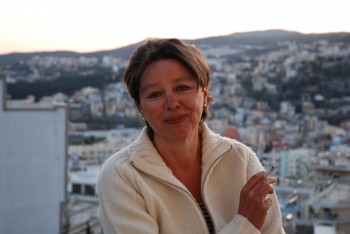Aquatic escapades
12 November 2010 | Reviews

Susanne Ringell. Photo: Anders Larsson
First about the form: the wavy, turquoise cover of Vattnen (‘Waters’), Susanne Ringell’s third collection of short stories, is protected by a layer of waxed paper that looks like a thin film of ice.
Inside the book, water flows everywhere: the twelve stories are set in it or near it, or mimic it in form. The water symbolises a fundamental force, a consolation, but also an elusivity. The characters in the stories exist in a kind of volatile, intermediate state – they are heading for a crisis or are in the moment immediately after one.
Since 1993 Ringell (born 1955) has produced short story collections, poetry, prose poetry, mini-stories and a novel. In them, as in Vattnen (Söderströms, 2010), Ringell’s language is her own: beautiful, robust and fragile, vivid, subtle and at the same time practical.
Ringell has remained faithful to the expressive brevity of her chosen format. Av blygsel blev Adele fet (‘Embarrassment made Adele fat’, 2001) consists of very short narratives (the whole book runs to only 62 pages) describing a series of people whose names are ordered according to the letters of the alphabet. From Adele to Walter, the author presents a human being with his or her miniature life story or situation.
One theme of Vattnen is travel, conceived as a place, a goal or an escape. Another, familiar from Ringell’s earlier work, is the child – the child who does not come, the condition of childlessness, the child who is dead. The opening story ‘Intrigen’ (‘The plot’) is a macabre, strange but humorous variant of this motif. An embryo lies in the amniotic fluid of a potential future mother’s womb, wondering if she (like all the main characters in the stories, the embryo is female) should allow herself to be born or not.
Although the water in the story ‘Gästabudet’ (‘The guest event’) is neither perfect nor clear and transparent, it is accepting and inclusive. The woman in the story has shaved her bikini line, she has bought a new bathing suit, prepared herself, as if she were to meet a lover, in order to descend into a pool – with dolphins. She becomes supple and right: at last she feels she is an inherent part of something.
There is always something lyrical and magical in the world of Ringell’s writing. This world is described in aesthetic terms, but it’s also fun, with an undercurrent of humour and self-mockery.
The narratives avoid the conventional structure of a short story, with a triumphal surprise at the end, presenting themselves rather as complex texts in which the refractory element dominates. The film of ‘ice’ around the book’s jacket illustrates the mood that lingers in the reader afterwards: there is something brittle covering the characters in the book, a thin layer that prevents them from flowing freely into carefree life, a transparency they themselves are not able to see through.
Translated by David McDuff
Tags: short story
No comments for this entry yet
